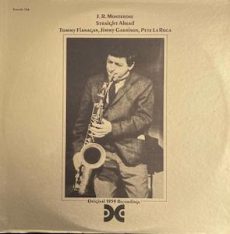
Daily Dose Of Jazz…
J.R. Monterose steps into the spotlight of this discussion with Straight Ahead (Xanadu Records 126). It was his second album as a leader and was released initially as The Message in 1960. J.R. was born Frank Anthony Peter Vincent Monterose Jr., and his initials come from Junior. He began playing the clarinet at age thirteen, then started the tenor sax two years later. Monterose was equally proficient on the soprano sax, but the tenor became his primary instrument. He’s collaborated with Kenny Burrell, Teddy Charles, Kenny Dorham, Jon Eardley, Charles Mingus, Buddy Rich, and George Wallington over his career. His bandmates on this date are three of the best in the business, Tommy Flanagan on piano, Jimmy Garrison on bass, and Pete La Roca on drums. My copy is the 1976 U.S. Mono reissue.
Straight Ahead, the first of five tunes composed by J.R. Monterose, opens the album with a brief introduction segueing into the quartet’s fleet melody. J.R. kicks off the solos with a brisk interpretation; next, Tommy builds a statement of pure excitement. J.R. and Pete share a swift exchange of notes, leading to the closing chorus and exit. Violet For Your Furs is a beautiful composition by Matt Dennis and Tom Adair from the forties. It begins with a brief dialogue between Monterose and Flanagan that blossoms into the ensemble’s elegant opening chorus. J.R. has the song’s only statement and brings out its warmth and lyricism in a display of intimate tenderness complemented by the rhythm section ahead of a soothing ending.
Chafic is the saxophonist’s tune for a French poodle he owned. The word’s definition in Arabic is merciful, and the pace moves upward for the foursome’s central theme. J.R. expresses his love and admiration for his pet in the opening statement. Tommy extends the pleasant feeling in the second interpretation, and Jimmy gets a bit of work leading to the climax. I Remember Clifford by Benny Golson, and Jon Hendricks closes the first side with a very touching rendition by the ensemble. The jazz standard is one of Golson’s most recorded tunes and a moving tribute to trumpeter Clifford Brown. A concise introduction by the leader opens the way for the foursome’s delicately gentle theme. Monterose again has the solo spotlight and crafts a charming interpretation into a serene finale.
Side Two is occupied by the final three tunes by J.R. Monterose, beginning with Green Street Scene, a blues that swings easily from the theme’s opening notes. The saxophonist goes to work first on an infectiously cheery solo. Tommy comes in next for an entertaining romp; then Jimmy takes a short stroll on the following reading. J.R. and Pete share a stimulating conversation before the close. You Know That is a swinger that the quartet brings vibrantly to life in the opening chorus. The saxophonist leads off with a compelling interpretation, then Flanagan gets into a swinging groove on the following statement. La Roca has a brief remark before Monterose returns for the closing theme reprise and a slow dissolve into nothingness.
Short Bridge is an exercise of pure joy, opening with a beautifully conceived melody and the opening statement by J.R. Tommy slides in next with one of his most mellow readings. The saxophonist returns with a memorable exclamation point ahead of the song’s conclusion. It’s unknown who produced the original album, but Don Schlitten produced the Xanadu reissue, and Paul Goodman remastered it. The album has an excellent soundstage through the treble, midrange, and low end. If you’re in the mood for an album that recaptures the spirit of Hard-Bop, I offer for your consideration Straight Ahead by J.R. Monterose. It’s a beautiful performance that’s highly recommended and worth the price of admission for a spot in any jazz library!
~ The Message (Jaro International JAM-5004/JAS-5004) – Source: Discogs.com ~ I Remember Clifford – Source: JazzStandards.com ~ Violet For Your Furs – Source: Wikipedia.org © 2022 by Edward Thomas Carter
More Posts: choice,classic,collectible,collector,history,instrumental,jazz,music,saxophone


